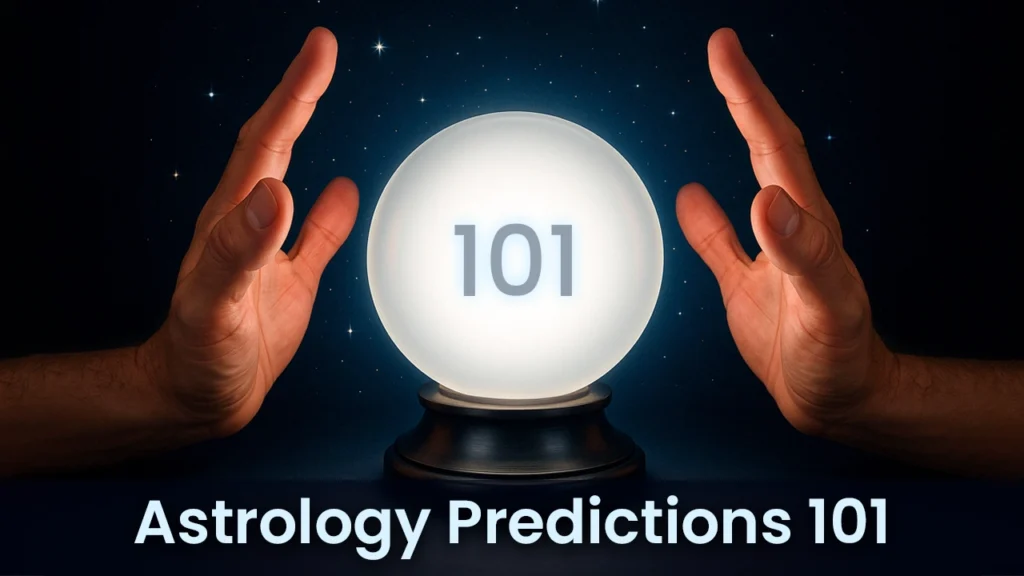Introduction to Astrology Predictions 101
Astrology has been a guiding light for centuries, offering insights into human behavior, relationships, and life events. Whether you’re a skeptic or a believer, astrology provides a unique lens through which to view the world—and perhaps even predict some of life’s biggest moments. In this guide, we’ll break down the basics of Astrology Predictions 101, explore how they work, and show you how to use them to decode your own journey.
For interesting astrology-related videos, subscribe to us on YouTube
1. What Are Astrology Predictions 101?
Astrology Predictions 101 are interpretations of planetary movements and their influence on individuals, relationships, and global events. These predictions are based on:
- Your natal chart (a map of where the planets were at the time of your birth).
- Current planetary transits (the movement of planets in real-time).
- Aspects (angles between planets that create energy shifts).
Astrologers believe these celestial patterns can reflect key moments in your life, such as career changes, love connections, or personal growth.
2. How Do Astrology Predictions Work?
Astrology operates on the principle that the positions of celestial bodies mirror energies that affect us here on Earth. Here’s how it works:
a) Natal Chart Analysis
Your natal chart is like your cosmic blueprint. It reveals your personality traits, strengths, weaknesses, and potential life themes. To generate your chart, you need:
- Your date of birth.
- Your exact time of birth.
- Your place of birth.
Read Also: Accurate Predictions: Analyze Your Birth Chart Kundli
Each planet represents different areas of life:
- Sun: Core identity and purpose.
- Moon: Emotions and inner world.
- Mercury: Communication and thinking style.
- Venus: Love and values.
- Mars: Ambition and drive.
- Jupiter: Expansion and luck.
- Saturn: Challenges and discipline.
b) Transits and Progressions
Transits occur when planets move through the sky and interact with your natal chart. For example:
- When Jupiter transits your 10th house, it could signal career opportunities.
- When Saturn squares your Sun, you might face challenges that test your resilience.
Progressions involve advancing your natal chart over time to see how your internal energies evolve.
c) Major Astrological Events
Some planetary movements have widespread effects:
- Eclipses: Catalysts for change; often mark beginnings or endings.
- Retrogrades: Periods when planets appear to move backward, prompting reflection and reassessment.
- Planetary Returns: When a planet returns to its original position in your natal chart (e.g., Saturn Return around age 29–30), signaling a milestone.
3. Decoding Life’s Biggest Moments Through Astrology
Let’s explore how astrology can help you anticipate and interpret significant life events:
a) Career Changes
The 10th house (career/public image) and Midheaven in your chart reveal your professional path. Watch for:
- Jupiter transits: Opportunities for growth or promotions.
- Saturn transits: Times of hard work and responsibility.
- Uranus transits: Sudden shifts or unconventional career moves.
Example: If Uranus enters your 10th house, you might feel compelled to leave a stable job for something more innovative.
Read Also: Full Moon Spiritual Rituals to Elevate Your Energy
b) Relationships and Love
The 7th house (partnerships) and Venus placement highlight romantic dynamics. Key indicators include:
- Venus retrogrades: Reevaluating love and values.
- Mars transits: Passionate encounters or conflicts.
- Synastry charts: Comparing two people’s charts to assess compatibility.
Example: A Venus-Mars conjunction in your chart could signify intense attraction or infatuation.
c) Personal Growth and Transformation
The 8th house (transformation) and Pluto placements focus on deep change. Look for:
- Pluto transits: Profound transformations, often involving letting go of old habits.
- Eclipses: Catalysts for major life shifts.
- Neptune transits: Spiritual awakening or creative inspiration.
Example: If Pluto opposes your Sun during a transit, you may experience a period of reinvention or self-discovery.
d) Health and Well-being
The 6th house (health/routine) and Virgo energy relate to wellness. Pay attention to:
- Mercury retrogrades: Potential miscommunication with doctors.
- Saturn transits: Discipline needed for long-term health goals.
- Jupiter transits: Boosts in vitality or healing.
Example: A Saturn transit to your 6th house might prompt you to adopt healthier habits or address chronic issues.
4. Tools to Enhance Your Astrology Predictions
To dive deeper into Astrology Predictions 101, try these tools:
a) Astrology Apps
Apps like Co–Star, The Pattern, and TimePassages provide daily horoscopes, transit updates, and personalized insights.
b) Ephemeris Charts
An ephemeris tracks planetary positions over time, helping you identify upcoming transits.
c) Professional Readings
Consult an astrologer for detailed interpretations of your natal chart and upcoming transits.
d) Retrograde Calendars
Track Mercury, Venus, and other retrogrades to prepare for reflective periods.
5. Common Misconceptions About Astrology Predictions 101
Before diving fully into astrology, it’s important to clarify a few myths:
Myth #1: Astrology predicts exact events.
Reality: Astrology identifies energetic influences—it doesn’t dictate specific outcomes. Free will always plays a role.
Myth #2: Horoscopes are one-size-fits-all.
Reality: General horoscopes (based on your Sun sign) only scratch the surface. For accurate predictions, consider your full natal chart.
Myth #3: Astrology is deterministic.
Reality: Astrology highlights potentials, not certainties. You have the power to shape your destiny.
6. Practical Tips for Using Astrology in Daily Life
Here’s how to integrate astrology into your routine:
- Start Small: Begin by tracking your Sun sign’s monthly horoscope to observe patterns.
- Track Transits: Note when planets enter new signs or retrograde, and reflect on their impact.
- Set Intentions During New Moons: Use lunar cycles to align with natural rhythms of growth and release.
- Journal Your Observations: Record how certain transits manifest in your life to better understand their influence.
Final Thoughts: Can Astrology Truly Decode Life’s Biggest Moments?
Astrology isn’t a crystal ball—it’s a tool for self-reflection and understanding. By decoding celestial patterns, you gain insight into life’s ebbs and flows, empowering you to navigate challenges and embrace opportunities. Whether you’re exploring love, career, or personal growth, astrology offers a framework for making sense of the unknown.
Read Also: Kundali Matching: Ensure a Happy Married Life
7 (FAQs) About “Astrology Predictions 101”
1. How accurate are Astrology Predictions 101?
Answer:
Astrology Predictions 101 are not definitive guarantees but rather interpretations of energetic influences based on planetary movements. Their accuracy depends on the depth of analysis (e.g., using a full natal chart vs. just your Sun sign) and how well you apply the insights to your life. While some people find astrology incredibly insightful, others may view it as more symbolic or metaphorical. It’s best to approach astrology as a tool for self-reflection rather than an absolute foretelling of events.
2. Do I need to know my exact birth time to use astrology for predictions?
Answer:
Yes, knowing your exact birth time is crucial for precise Astrology Predictions 101. Your birth time determines the positions of the planets in your natal chart, including the Ascendant (Rising Sign) and house placements, which influence specific areas of your life. Without this information, predictions may lack accuracy. If you don’t know your birth time, you can still explore general trends using your Sun sign, but deeper insights will be limited.
3. Can astrology predict specific dates for major life events?
Answer:
Astrology doesn’t pinpoint exact dates for events like marriage, career changes, or health issues. Instead, it highlights periods of heightened energy or potential shifts (e.g., during eclipses, retrogrades, or significant transits). For example, Saturn’s return around ages 29–30 often signals a period of maturity and responsibility, but the specifics depend on your choices and circumstances. Think of astrology as a guide, not a calendar.
4. What’s the difference between a natal chart and a horoscope?
Answer:
- A natal chart is a personalized map of where the planets were at the moment of your birth. It provides detailed insights into your personality, strengths, challenges, and life themes.
- A horoscope is a general forecast based on your Sun sign (e.g., Aries, Taurus) and current planetary transits. Horoscopes are less personalized than natal charts but serve as a quick way to understand broad trends.
For accurate predictions, a natal chart reading is far more comprehensive than a daily or monthly horoscope.
5. How do retrogrades affect astrology predictions?
Answer:
Retrogrades occur when planets appear to move backward from our perspective on Earth. During these periods, the energy associated with that planet tends to shift inward, prompting reflection, reassessment, and sometimes delays. For example:
- Mercury retrograde: Communication and technology glitches; ideal for revisiting old projects.
- Venus retrograde: Reevaluation of relationships and values.
- Saturn retrograde: Reviewing long-term goals and responsibilities.
Astrologers interpret retrogrades as opportunities to slow down and refine certain areas of life before moving forward again.
6. Can astrology help me make decisions about love, career, or finances?
Answer:
Astrology can provide guidance by highlighting favorable or challenging energies during specific periods. For instance:
- Love: Venus transits or 7th-house activity might indicate romantic opportunities.
- Career: Jupiter transits to the 10th house could signal professional growth.
- Finances: Taurus or 2nd-house influences might suggest stability or shifts in income.
While astrology can offer valuable perspectives, it’s important to combine its insights with practical decision-making, intuition, and expert advice when needed.
7. Is astrology compatible with science, or is it purely spiritual?
Answer:
Astrology exists in a gray area between science and spirituality. While it lacks empirical evidence to support its claims, many people find value in its symbolic language and ability to foster self-awareness. Some scientists argue that astrology’s patterns align with psychological principles (e.g., Carl Jung’s concept of synchronicity), while others dismiss it entirely. Ultimately, whether you see astrology as scientific, spiritual, or simply philosophical depends on your personal beliefs and experiences.

